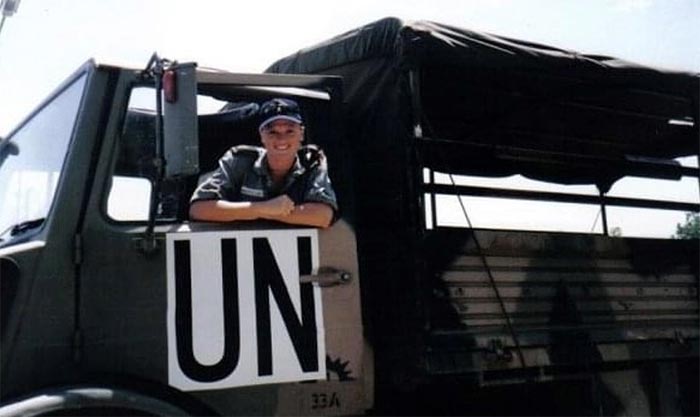Chantelle Bohan

Photographer unknown. (1999). Chantelle Bohan in United Nations truck.
Chantelle Bohan joined Royal Australian Navy(RAN) as a Combat Systems Operator in 1997, specialising in sonar operation.
After a couple of years at the Joint Intelligence Centre, she was posted to HMAS Tobruk, a Landing Craft Heavy transport vessel.
‘So the only ship I ever served on didn’t actually have a sonar on it!’ she says.
That was in mid-1999, and soon after Tobruk was directed to transport Australian Army troops and equipment to East Timor as part of International Force East Timor (INTERFET).
HMAS Tobruk could transport around 500 Army personnel, their tanks, vehicles and other equipment, and initially made 3 quick runs between Darwin and Dili.
‘We were considered a “high value unit” due to the cargo we were carrying, and I recall on one occasion we had 3 warships sailing in sectors around us because there was a possibility that there could be opposition to that cargo making it to its destination,’ says Chantelle.
‘On another, we were called to “action stations” due to foreign vessels not responding to communications or complying with instructions.’
Upon entering Dili’s harbour, Chantelle was confronted by sights that remain with her to this day:
‘You could see the fires in the hills, as we got closer the smells hit, the destruction, the debris in the water, and there was a fear that we would see bodies in that water, and burned buildings that couldn’t be inhabited.
‘In times of anxiety I look for something familiar to ground myself. At that time, as the ship was pulling alongside, it was pigeons. With everything that was going on around me, I vividly remember thinking how skinny the pigeons were in Dili. They’re scavengers – and they didn’t have enough food.’
Promoted to Leading Seaman during INTERFET, Chantelle was soon deployed to the Solomon Islands, where Tobruk supported the evacuation of almost 500 Australians and other foreign nationals after fighting by disparate militant groups saw the overthrow of the central government. Peace talks later took place and a ceasefire agreement was signed on board.
More than 20 years since her departure from the Navy, Chantelle says she loved her time with the Australian Defence Force (ADF).
‘I have nothing but good memories of my service,’ she says. ‘I acknowledge I have friends and colleagues whose experiences were different from mine, but for me, even what you thought in the moment was a bad time actually wasn’t, because you are not alone – you’re surrounded by people going through the same thing.’
In her varied public service career since the ADF, including 11 years with DVA and 8 years with Veterans SA, Chantelle has continued to use her Defence force experience to support ex-service personnel.
‘That teamwork, that camaraderie, the common goals – once it’s ingrained in you, it never leaves. “It’s not my job” is not an option. If something needs to be done, you muck in and get it done.’
Recently returned to DVA, Chantelle continues to do her part.
‘As tragic as the reason for the Royal Commission is, we acknowledge that we’ve missed the mark in some areas, and now is the opportunity to fix things, to do things better.’
Source: DVA interview with Chantelle Bohan, September 2024.
